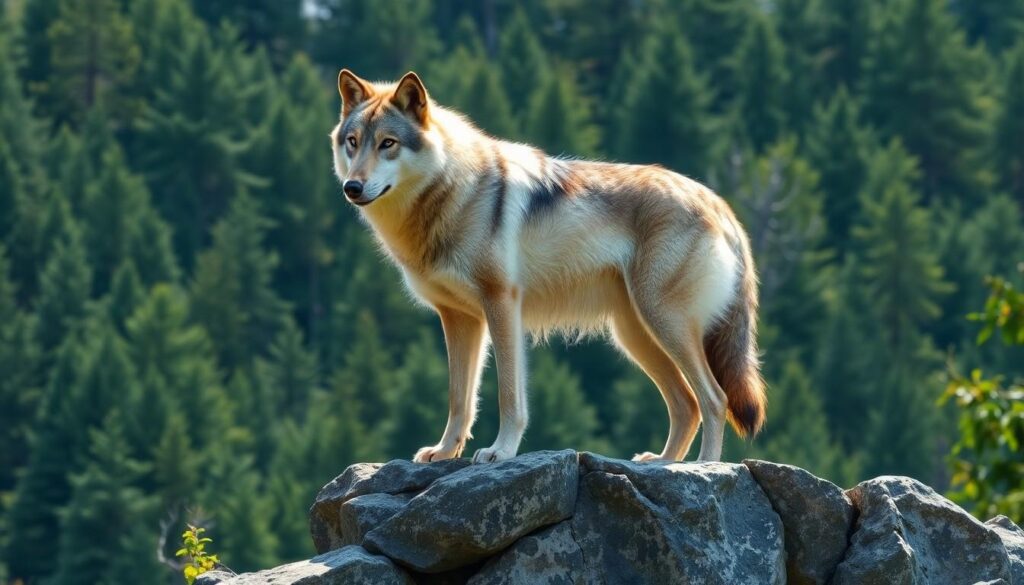Wolves captivate our imagination with their primal beauty, pack mentality, and mysterious nature. Whether you’re naming a pet, creating a character, or simply fascinated by these majestic creatures, finding the perfect wolf name can be both exciting and meaningful.
We’ve gathered an extensive collection of wolf names inspired by various cultures, mythologies, and wolf characteristics. From powerful Norse-inspired names to Native American tributes, our list celebrates the wolf’s significance across human history. You’ll discover options that highlight the strength, loyalty, and wilderness spirit these magnificent animals embody.
The Top 25 Most Powerful Wolf Names and Their Meanings
Looking for a wolf name that exudes power and strength? We’ve carefully curated this list of the 25 most powerful wolf names from various mythologies and cultures, each carrying important meaning that captures the essence of these magnificent creatures.
- Fenrir – This name comes from Norse mythology, referring to a monstrous wolf destined to kill Odin during Ragnarök, symbolizing unstoppable power.
- Akela – From Rudyard Kipling’s “The Jungle Book,” Akela means “solitary” in Hindi and represents leadership and wisdom as the pack leader.
- Blaidd – A Welsh word simply meaning “wolf,” this name carries an ancient power and mystique in its pronunciation (sounds like “blaithe”).
- Lobo – Spanish for “wolf,” this straightforward name has become synonymous with wild, untamed power in many cultures.
- Amarok – In Inuit mythology, the Amarok is a gigantic wolf that hunts alone at night, embodying fierce independence.
- Varg – A Norse term for wolf, this name carries connotations of strength and primal power in Scandinavian cultures.
- Accalia – In Roman mythology, she was the she-wolf who nursed Romulus and Remus, symbolizing maternal protection and fierce devotion.
- Damon – With Greek origins meaning “to tame” or “subdue,” this name suggests controlled power and intelligence.
- Vandal – Representing wild destruction and untamed force, this name evokes the wolf’s fierce reputation.
- Lycan – Derived from the Greek “lykos” meaning wolf, this name connects to the mythological werewolf legend.
- Okami – Japanese for “wolf,” this name carries respect and reverence as wolves are considered divine messengers in Japanese folklore.
- Hati – In Norse mythology, Hati chases the moon across the night sky, representing relentless pursuit and determination.
- Skoll – The brother of Hati in Norse legends, Skoll pursues the sun, symbolizing ambition and persistence.
- Hemming – An Old Norse name meaning “shape-changer” or “skin of a wolf,” connecting to ancient shape-shifting legends.
- Ulric – Germanic in origin, this powerful name literally means “wolf ruler” or “wolf power.”
- Ulfr – The Old Norse word for “wolf,” simple yet carrying the weight of ancient Viking respect for these animals.
- Tala – A Native American name meaning “stalking wolf,” embodying stealth and calculated hunting prowess.
- Adalwolf – Germanic for “noble wolf,” this name combines nobility with wild strength.
- Convel – Celtic in origin, meaning “high wolf” or “chief wolf,” suggesting leadership and dominance.
- Lupus – The Latin word for wolf, carrying classical power and the weight of ancient Roman symbolism.
- Raoul – With Germanic roots meaning “wolf counsel,” this name suggests wisdom combined with strength.
- Wulfric – Anglo-Saxon in origin, meaning “wolf ruler” or “wolf-powered,” representing authority and might.
- Bardolf – Germanic name meaning “bright wolf,” suggesting intelligence and cunning alongside physical power.
- Adolphus – Though less commonly used now, this traditional Germanic name means “noble wolf,” combining prestige with natural power.
- Vukašin – A Slavic name meaning “little wolf,” demonstrating that even wolves of smaller stature possess formidable strength and tenacity.
These powerful wolf names don’t just sound impressive—they carry rich historical and mythological significance that honors the wolf’s legacy as a symbol of strength, loyalty, and wilderness. When choosing a name from this list, you’re connecting with ancient traditions that have revered wolves for thousands of years.
Historical and Mythological Wolf Names From Around the World

Throughout history, wolves have played important roles in mythologies and cultural narratives across different civilizations. These powerful creatures have inspired some of the most intriguing names, rich with symbolic meaning and historical significance.
Norse Wolf Names
Norse mythology features several prominent wolf figures, each with unique roles in their cosmic stories. Odin, the supreme deity, kept two loyal wolf companions named Geri and Freki by his side, symbolizing the destructive power associated with this god of wisdom, war, and death. The cosmic wolves Sköll and Hati, sons of the giant wolf Fenrir and the giantess Iarnvida, chase the Sun and Moon respectively across the sky. According to ancient Norse beliefs, when these wolves finally catch their celestial prey, it will trigger Ragnarök, the end of the industry. Fenrir himself, also known as Fenrisúlfr, Hróðvitnir, or Vánagandr, stands as one of the most fearsome creatures in Norse legends, prophesied to kill Odin during Ragnarök. Another important wolf figure, Garmr, is closely associated with the events of Ragnarök, though his role isn’t as clearly defined as Fenrir’s in the mythology.
Greek and Roman Wolf Names
Greek and Roman mythologies contain equally fascinating wolf figures with compelling stories. Lycaon appears in Greek mythology as a king transformed into a wolf by Zeus as punishment for his extreme cruelty, giving rise to the term “lycanthropy” for wolf transformation. Roman mythology celebrates Lupa, the legendary she-wolf who nursed the twin brothers Romulus and Remus, the founders of Rome. This maternal wolf figure represents nurturing strength and has become an enduring symbol of Roman heritage. Mars’ Wolves hold special significance in Roman lore as well, with wolves frequently depicted alongside Mars, the god of war. According to legend, it was a she-wolf sent by Mars who discovered and nursed the abandoned twins Romulus and Remus, creating a powerful connection between wolves and Roman origin stories.
Native American Wolf Names
Native American traditions honor wolves through various mythological figures and symbolic representations. Wahya, the wolf in Cherokee mythology, often appears as a clever trickster figure while embodying qualities of loyalty and perseverance that tribes admired. In Lakota mythology, Ictinike represents a cunning shape-shifter capable of assuming wolf form, symbolizing adaptability and intelligence. Some Southwestern tribal traditions, particularly among the Navajo, speak of Skin-Walkers, witches with the ability to transform into wolves or other animals. These figures differ from purely mythological characters, representing a more complex spiritual concept involving magical transformation. Across various Native American cultures, wolf names and figures reflect diverse roles, from spiritual guides to symbols of family loyalty and wilderness wisdom.
Popular Wolf Names From Books, Movies, and TV Shows

Fictional wolves have captured our imagination across various entertainment media, becoming some of the most memorable characters in popular culture. These iconic wolves from literature, film, and television offer excellent inspiration for wolf names.
Game of Thrones Wolf Names
The Stark children’s direwolves from George R.R. Martin’s “A Song of Ice and Fire” series and the HBO adaptation “Game of Thrones” feature some of the most recognizable wolf names in modern fiction. Grey Wind, Robb Stark’s loyal companion, earned his name for his incredible speed and ferocity in battle. Lady, adopted by Sansa Stark, met a tragic end when she was executed after Joffrey’s manipulation. Nymeria, Arya Stark’s fierce direwolf, displayed remarkable loyalty and eventually became the leader of a wild wolf pack in the Riverlands. Summer protected Bran Stark with unwavering courage, even attacking a White Walker and helping Bran develop his skin-changing abilities before eventually sacrificing himself. Shaggydog, with his distinctive black fur and aggressive temperament, reflected young Rickon Stark’s wild and tumultuous experiences. Ghost, Jon Snow’s albino direwolf, stands out for his silence, loyalty, and remarkable survival instincts, making him one of the few direwolves to survive throughout the series.
Twilight Saga Wolf Names
Stephenie Meyer’s “Twilight” series introduced readers to the Quileute werewolves, who transform into wolves to protect their tribe and loved ones. Jacob Black serves as the primary werewolf character, whose transformation enables him to protect Bella Swan throughout the saga. Leah Clearwater stands out as the only female werewolf in the entire pack, breaking tradition in the Quileute werewolf lineage. Seth Clearwater, Leah’s younger brother, becomes another key member of the wolf pack with a important role in the story. Quil Ateara, one of Jacob’s close friends, joins the werewolf pack and embraces his supernatural heritage. Embry Call rounds out the core group of Quileute werewolves, adding to the pack’s strength and unity in their mission to protect their territory.
Other Famous Fictional Wolves
Literature, film, and folklore have given us many iconic wolf characters that have stood the test of time. The Big Bad Wolf appears as the classic antagonist in beloved fairy tales like “Little Red Riding Hood” and “The Three Little Pigs,” representing danger and cunning. Fenrir from Norse mythology intimidates with his immense size and strength as the monstrous wolf son of the trickster god Loki. The Wolf features prominently in Aesop’s timeless fable “The Boy Who Cried Wolf,” teaching generations about the consequences of dishonesty. Balto, the half-wolf hero of the animated film bearing his name, demonstrates remarkable courage by leading a sled dog team on a treacherous journey to deliver life-saving medicine to children in Nome, Alaska. White Fang, the protagonist of Jack London’s classic novel, captivates readers as a wild wolfdog who transitions from the harsh wilderness to domestication through the kindness of a compassionate human companion.
Choosing the Perfect Name for Your Wolf Character or Pet

When selecting a name for your wolf character or pet, it’s important to consider their unique traits and appearance. The perfect name can reflect their personality, physical characteristics, and even their role in your story or life.
Names Based on Wolf Characteristics
Personality-inspired names create an immediate connection to your wolf’s behavior and temperament. For bold or fierce wolves, names like “Hunter” or “Helldog” perfectly capture their dominant nature and hunting prowess. Gentler or more mysterious wolves might be better suited to names such as “Luna” or “Shaman,” reflecting their enigmatic qualities and spiritual connections.
Behavior traits also provide excellent naming inspiration. “Scout” works wonderfully for curious wolves who love to explore their surroundings and lead the way. “Shadow” fits perfectly for stealthy wolves who move quietly or prefer to stay in the background of the pack. Other trait-based names like “Aragorn” or “Inigo” can reflect leadership qualities or fighting skills that make your wolf character unique.
Names Based on Wolf Coloration
Coat color offers a natural source of naming inspiration that immediately connects to your wolf’s appearance. White wolves shine with names like “Alaska” or “Aspen,” evoking images of snow-covered landscapes that match their pristine fur. Gray wolves carry names such as “Maple” or “Shadow” with dignity, reflecting the various shades and tones in their beautiful coats.
Black wolves look magnificent with names like “Ink” or “Bear,” highlighting the deep, rich color of their fur. Wolves with distinctive markings deserve special consideration too. Names like “Aztec” work beautifully for wolves with intricate or unique fur patterns that set them apart from others in the pack.
Famous wolves from mythology can also inspire great names. “Loki” from Norse mythology might suit a trickster wolf with a playful personality. Female wolves might carry elegant names like “Aiyana,” “Akira,” “Luna,” or “Maya,” while male wolves could bear stronger names such as “Hugo” or “Scout.”
Remember that physical abnormalities or unique features should be considered when naming your wolf. These distinctive traits help create a more personalized and meaningful name that truly represents your wolf’s individuality.
Unique Male Wolf Names That Exude Strength

Names with Strong Connotations
When naming a powerful male wolf, consider options that instantly evoke strength and dominance. Thor, named after the Norse god of thunder, symbolizes unmatched power and authority in the pack. Zeus draws from Greek mythology, representing supreme leadership qualities that a dominant wolf often displays. Rex, the Latin word for “king,” perfectly captures the regal nature of a pack leader. Titan works wonderfully for larger, more imposing wolves with commanding presence. Ragnar, inspired by the legendary Viking warrior, suggests both bravery and tactical intelligence that wolf leaders often demonstrate.
Names with Cultural Significance
Cultural heritage provides rich options for meaningful wolf names. Beowulf, an Anglo name meaning “intelligent wolf,” brilliantly combines wisdom with strength for a thoughtful yet powerful wolf. Conan comes from Gaelic origins and translates to “wise wolf,” reflecting both intelligence and courage. Wulfgar, with its English roots meaning “wolf-like spear,” indicates a direct and fierce protector. Gunnolf, a powerful Norwegian name meaning “fighting wolf,” symbolizes combat readiness and warrior spirit that many dominant wolves embody.
Names Reflecting Physical and Behavioral Traits
A wolf’s distinctive characteristics can inspire the perfect name. Blaze suits a wolf with fiery energy and unstoppable determination. Hunter acknowledges the natural predatory prowess that makes wolves such effective pack hunters. Steel represents the unbreakable resilience that wolves show in harsh environments. Grizzly works well for a wolf with a particularly imposing or rugged appearance. Diesel suggests raw power and endurance, perfect for a wolf that never seems to tire during long hunts.
Unique and Powerful Names
For truly distinctive options, consider these standout choices. Fenris draws from Norse mythology, referring to a monster wolf of incredible might. Bardawulf, an English name meaning “ax wolf,” conveys a formidable cutting force. Rogue perfectly captures the independent spirit of a wolf that forges its own path with confidence. Blizzard evokes the unstoppable force of nature, ideal for a wolf with an intense and powerful presence.
Names Inspired by Nature and Mythology
The natural industry offers inspiration for strong wolf names. Klondike suggests the rugged wilderness of Alaska, conveying survival skills and adaptability. Kodiak, named after the mighty Kodiak bear, implies tremendous strength and hunting ability. Stark communicates a bold, direct nature with uncompromising strength, fitting for a wolf that stands out even among other powerful pack members.
Beautiful Female Wolf Names With Powerful Meanings

From German and Norse Mythology
Female wolves deserve names that match their natural elegance and strength. Ulva, a German name meaning “she-wolf” and “brave,” perfectly captures the dual nature of female wolves as both nurturing and formidable. Geri represents one of Odin’s two wolves in Norse mythology and translates to “hard spear,” symbolizing precision and power. Leto, while primarily known as a title for the Greek goddess of wolves, also conveys happiness and joy in Italian, making it ideal for a spirited female wolf.
Names Directly Meaning Wolf
Several languages offer beautiful names that literally translate to “wolf.” Velvela comes from Hebrew and Yiddish traditions, directly meaning “wolf” with a melodious sound that suits a graceful female. Zella, another Hebrew name meaning “wolf,” provides a shorter, more distinctive option with a modern feel. Lupa, derived from Latin, specifically means “she-wolf” and carries historical significance as the name of the legendary wolf who nursed Romulus and Remus, the founders of Rome.
Names with Wolf Associations
Names connected to wolf mythology offer rich cultural depth. Freya, though not directly meaning wolf, represents the Norse goddess of love and fertility who was often associated with these magnificent creatures. Hulda packs a powerful punch as a Norse name meaning “wolf battle” or “fierce wolf,” perfect for a dominant female. These associations create an immediate connection to the proud wolf heritage without being too literal.
Names with Strong and Fierce Connotations
Female wolves exhibit remarkable strength and leadership, qualities reflected in names like Artemis, the Greek goddess of wild animals who held special connections with wolves. Athena honors the Greek goddess of war, symbolizing wisdom alongside strength—traits often observed in pack matriarchs. Valkyrie draws from Norse tradition, representing the female warriors who chose which soldiers would live or die in battle, embodying the decisive nature of female wolves.
Names with Nature and Wilderness Themes
The natural habitat of wolves provides inspiration for many beautiful names. Alpine references the mountainous regions wolves often inhabit, suggesting majesty and elevation. Aspen calls to mind the trees found in cold mountain environments where wolf packs thrive. Aurora evokes the northern lights that illuminate the night skies in wolf territory, blending beauty with mystery in a name that feels both wild and ethereal.
Other Distinctive Wolf Names
Beyond traditional categories, several unique options stand out for female wolves. Lupina derives from Latin roots meaning “she-wolf,” offering a feminine yet powerful choice. Wulfgara adapts the traditionally male name Wulfgar (meaning “wolf spear”) into a feminine form while maintaining its strength. Akira brings Japanese influence with a meaning of “bright” or “clear,” which can be associated with the haunting clarity of a wolf’s howl across mountain valleys.
Pack-Inspired Wolf Names for Groups or Families

Nature-Inspired Pack Names
Looking for a name that connects your wolf pack to the natural industry? Strong, earthy names like Alder, Beech, Oak, and Laurel evoke a sense of strength and woodland heritage that perfectly captures the essence of a wolf family. These names root your pack in the natural environment where wolves thrive. Sierra pack references majestic mountain ranges where wolves often make their home, while the Willow pack suggests grace and flexibility—qualities essential for successful wolf families.
Celestial and Mythological Pack Names
Wolves have long been associated with night, moon, and cosmic forces in various mythologies. Names like Luna Pack (meaning “moon”) create an immediate connection to wolves’ nocturnal nature. The Aurora Pack, named after the Northern Lights, suggests something magical and rare. Selene Pack, named for the Greek goddess of the moon, adds a touch of ancient wisdom and power. For packs with a mysterious quality, consider Nyx Pack (after the Greek goddess of night) or Vesper Pack (meaning “evening star”).
Thematic Environmental Pack Names
Creating a pack name that reflects a exact habitat or environment creates instant character and recognition. The Caligo Pack (meaning “Fog Pack”) works beautifully for wolves dwelling in misty mountain territories. Terrain-based names connect your wolf family directly to their natural surroundings, establishing a strong sense of place and belonging.
Wind and Elemental Pack Names
Elements of nature provide powerful naming opportunities for wolf packs. Naming your pack after one of the four winds, such as the Eurus Pack (east wind), ties your wolves to forces of nature that are untamable and free. Elemental names create a cohesive identity for wolves who share their wild industry with these primal forces.
Distinctive and Descriptive Pack Names
Pack names that highlight distinctive qualities create immediate character recognition. The Rogue Pack might be known for standing apart from traditional territories. A Savage Pack suggests fierce hunters not to be crossed. The Thorn Pack indicates wolves with sharp edges and formidable defenses. For packs with more subtle qualities, names like Misty Pack (suggesting something ethereal) or Bliss Pack (indicating harmony) establish immediate personality.
Family Naming Systems
Many wolf packs benefit from a cohesive naming system that identifies lineage and connections. Using the den or territory name as a family identifier—giving pups the name of the den as a surname—creates continuity across generations. This approach mirrors how wild wolf packs maintain strong family bonds while allowing individual wolves to have their own distinct identities within the greater pack structure.
Modern and Trending Wolf Names in 2023

Diverse and Unique Names
Gray-inspired names have become incredibly popular this year, with Slate, Graypaw, and Tin leading the pack for their beautiful connection to the wolf’s natural coloring. Names that incorporate “gray” into creative combinations like Grayhowl, Grayshadow, and Graymoon perfectly capture both appearance and spirit of these majestic creatures. Aspen, drawing inspiration from trees found in wolves’ natural mountainous habitats, offers a refreshing alternative that’s trending among wolf enthusiasts in 2023.
Strong and Mystical Names
Mythological names continue to dominate the wolf-naming industry this year. Artemis, the Greek goddess of wild animals and the hunt, provides a powerful and meaningful option that honors the wolf’s wild nature. Athena, goddess of wisdom and strategic warfare, lends strength and intelligence to any wolf bearing this distinguished name. We’ve also noticed Morrigan gaining popularity, with its roots in Irish mythology representing power and ferocity that perfectly embodies the wolf’s commanding presence.
Nature-Inspired Names
The natural industry offers endless inspiration for trending wolf names. Vapor, Haze, and Murk evoke the mysterious environments where wolves thrive and hunt. Location-based names like Alaska and Kodiak connect directly to renowned wolf territories, while Falcon Gray combines natural elements for a distinctive touch. These nature-inspired options reflect the deep connection between wolves and their wild habitats.
Playful and Creative Names
Not all wolf names need to be serious or intense. Flipper, inspired by the gray dolphin, adds a playful, unexpected element to wolf naming. Creative combinations like Smazy and unique options such as Maverick and Myst offer fresh alternatives for those seeking something different. These playful names can perfectly complement a wolf with a more lighthearted or mischievous personality.
Dark and Intense Names
For wolves with darker coloration or more intense personalities, names like Charcoal, Anthracite, Coal, and Onyx provide perfect matches. Fire-themed options including Blaze, Volcanic, and Ember suggest a powerful, untamed spirit that many find appealing for these magnificent creatures. These intense names capture the wolf’s formidable presence and commanding energy.
Other Trending Names
Several standout names have risen in popularity without fitting neatly into exact categories. Akela, familiar to many from “The Jungle Book,” carries leadership connotations. Remus connects to Roman mythology while Raksha and Wilder emphasize the wild, protective nature of wolves. Draven, Garnet, and Lorelei offer distinctive options with mystical undertones that have caught attention among wolf enthusiasts and character creators alike in 2023.
How to Create Your Own Meaningful Wolf Name

Combining Words and Syllables
Creating your own wolf name can start with merging meaningful words or syllables. We’ve found this technique particularly effective for crafting names that reflect exact wolf traits. For example, combining “shadow” and “fang” gives you Shadowfang, instantly conveying stealth and power. Try pairing words that represent strength, wilderness, or intelligence to develop a name that resonates with the wolf’s essence.
Using Anagrams
Anagrams offer a creative approach to wolf naming by rearranging letters from relevant words. You’ll discover unique options by shuffling letters from words like “hunter,” which can transform into Thuner. This method helps generate distinctive names that maintain connections to wolf characteristics while standing out from common choices.
Incorporating Titles and Epithets
Adding titles elevates simple wolf names to ones that command respect. We recommend prefixes like “Alpha,” “Guardian,” or “Leader” to emphasize status and authority. Alpha Ragnar, for instance, immediately establishes a dominant presence and leadership qualities. These titles work particularly well for wolves that hold important positions within their packs.
Borrowing from Different Languages
Languages around the industry offer rich vocabularies for wolf naming. Lupo (Italian for wolf) can become Luporin, creating a name with international flair and deeper cultural significance. French, Norse, and Native American languages provide especially powerful options that connect your wolf name to ancient traditions of wolf reverence.
Nature-Inspired Names
Natural elements serve as perfect inspiration for wolf names that reflect their habitat. Alpine evokes mountainous terrains where wolves hunt, while Aspen references the forests they call home. Aurora captures the magical northern skies under which wild wolves roam. These nature-based names create immediate associations with the wild environments wolves inhabit.
Mythological and Literary Inspirations
Myths and literature provide a treasure trove of wolf naming possibilities. Anubis draws from Egyptian mythology, connecting wolves to ancient divine beings. Artemis, the Greek goddess of wild animals, offers a perfect reference for a noble wolf. These culturally important names carry built-in stories and meanings that enhance your wolf’s identity.
Traditional and Cultural Names
Historical names with direct wolf connections offer authenticity and depth. Adalwolf or Adalwolfa literally mean “noble wolf” in German, providing both beautiful sounds and meaningful etymology. Acwulf, meaning “wolf from the oak meadows,” connects to both nature and heritage. These traditional options honor the long relationship between humans and wolves across various cultures.
Conclusion: Finding the Perfect Wolf Name That Resonates
Wolf names carry power that transcends mere labels. They connect us to ancient traditions while expressing our admiration for these magnificent creatures. Whether you’re naming a pet wolf-dog a character in your story or simply appreciating wolf culture there’s something magical about finding that perfect name.
The ideal wolf name reflects strength loyalty and wildness while honoring the rich cultural heritage wolves represent. From mythology to modern trends we’ve explored countless options to inspire your choice.
Remember that the best wolf name eventually resonates with you personally. Trust your instincts just as wolves do. The perfect name will naturally emerge when you connect with the spirit of these remarkable animals that have captivated human imagination for thousands of years.
Frequently Asked Questions
What are some of the most powerful wolf names from mythology?
Some of the most powerful mythological wolf names include Fenrir (the monstrous wolf from Norse mythology), Akela (the wise pack leader from “The Jungle Book”), and Amarok (the giant wolf from Inuit mythology). Other significant names include Geri and Freki (Odin’s wolf companions), Sköll and Hati (cosmic wolves from Norse tales), and Lupa (the she-wolf who nursed Romulus and Remus in Roman mythology).
How should I choose a name for my wolf character?
Choose a name that reflects your wolf character’s unique traits, personality, and appearance. Consider their temperament (using names like “Hunter” for bold wolves or “Luna” for gentle ones), coat color (like “Alaska” for white wolves or “Ink” for black wolves), and any distinctive physical features. Cultural and mythological references can add depth, while names from popular fiction can provide recognizable inspiration.
What are some popular female wolf names?
Popular female wolf names include Ulva and Velvela (which directly mean “wolf”), mythological choices like Freya, Artemis, and Valkyrie (representing strength and leadership), and nature-inspired names such as Alpine and Aurora. Other beautiful options include Luna (moon-related), Nymeria (from “Game of Thrones”), and Leah (from “Twilight”). These names combine elegance with power, perfect for female wolves.
Where do traditional wolf names come from?
Traditional wolf names come from various cultural sources, including Norse mythology (Fenrir, Geri, Freki), Native American traditions (Wahya, Ictinike), Greek and Roman mythology (Lycaon, Lupa), and Germanic folklore. These cultures revered wolves as symbols of loyalty, strength, and wilderness, creating names that reflected their spiritual significance and powerful nature. Many traditional names have deep meanings connected to the wolf’s role in ancient stories.
What are good wolf pack names?
Good wolf pack names include nature-inspired options like Timber Pack or Alder Pack, celestial names such as Luna Pack or Eclipse Pack, and thematic environmental names like Mountain Ridge Pack. Elemental names (Storm Pack, Frost Pack), descriptive names highlighting unique qualities (Rogue Pack, Shadow Pack), and family naming systems that reflect lineage also make excellent choices for wolf packs.
What wolf names are trending in 2023?
Trending wolf names in 2023 include gray-inspired names (Slate, Graypaw), mythological names (Artemis, Athena), nature-inspired names (Vapor, Haze), and playful options like Flipper. Dark and intense names such as Charcoal and Ember remain popular, alongside standout classics like Akela and Remus. Mystical names like Draven and Lorelei are gaining popularity, reflecting contemporary tastes while honoring wolf mythology.
How can I create my own unique wolf name?
Create unique wolf names by combining meaningful words or syllables (like “Silver” and “Fang” to make “Silverfang”), using anagrams of descriptive terms, or incorporating titles (Alpha, Commander). Borrow from different languages for cultural significance (like “Lobo” from Spanish), or draw inspiration from nature, mythology, and traditional names. This personalized approach creates meaningful names that resonate with your wolf’s identity.
What are good wolf names from popular fiction?
Popular fictional wolf names include Grey Wind, Ghost, and Nymeria from “Game of Thrones,” Jacob Black and Leah Clearwater from the “Twilight” series, and the iconic Big Bad Wolf from fairy tales. Other notable names include Akela and Raksha from “The Jungle Book,” White Fang from Jack London’s novel, and Balto, based on the real-life heroic sled dog who inspired films.
What are strong male wolf names?
Strong male wolf names include mythological powerhouses like Thor, Zeus, and Odin; culturally significant names such as Beowulf and Wulfgar; and names reflecting physical prowess like Blaze, Diesel, and Rex. Nature-inspired options like Klondike and Kodiak evoke rugged wilderness, while historical names like Viking and Warrior connect to themes of courage and dominance.
What do wolf names symbolize across cultures?
Across cultures, wolf names symbolize strength, loyalty, family bonds, wildness, and spiritual connection. In Norse culture, wolves represent both creation and destruction. Native American traditions see wolves as guides and teachers. Germanic cultures associate wolves with warriors. Wolf names reflect these cultural values, embodying primal power, protection, intelligence, and the delicate balance between civilization and wilderness that wolves have represented throughout human history.







